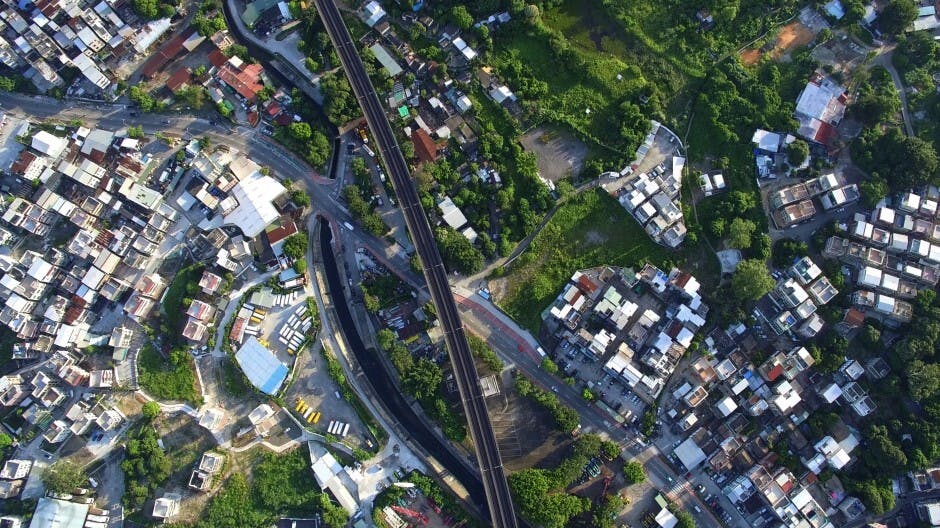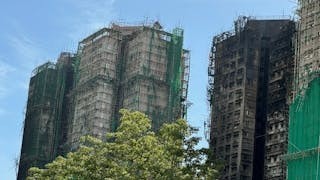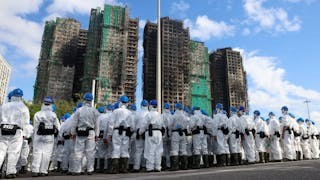Cover Photo: An aerial view of Hong Kong’s northern distrist. (eyepress)
After decades of skullduggery by vested interests and outdated practices, a new system of land allocation across the New Territories must be introduced that is fully and fairly representative of all concerned parties. There are several ways this can be done.
Skrike a balance between all stakeholders
The customary practice for land officials to consult individuals and rural leaders over the usage and developmental plans in the New Territories must be institutionalized. A higher-level board should be established to oversee all such plans for Hong Kong, including the New Territories, while ensuring feedback from all sectors is taken into account.
Ideally that board should be chaired by the chief secretary and composed of officials from the Lands Department, Housing Department, Planning Department, district officers from the 18 district councils, and top officials of the Town Planning Board.
At present, once the government’s land development plans are discussed at the district and rural levels, individuals and groups with vested interests are bound to lobby the government for the protection of their interests while ignoring the primacy of the public interest.
Such individuals and groups must realize the need to strike a balance between their position and the public interest. However, the current political structures give them the power to veto developmental plans even if they would serve the public interest better than private interests.
The suggested new land allocation system would end this anomaly — otherwise the process of land administration will remain highly politicized with veto power resting with those few who have been consulted. Those residents who have not been consulted find themselves left out in the cold.
How to prevent allegation of skullduggery?
To prevent any possible criminal elements distorting land and housing development plans, the district officers in the 18 districts should be empowered to work closely with the police so that sensitive information on land development is not revealed prematurely to favor any party.
To date, the entire land developmental consultative process has perhaps been marred by the early release of sensitive information to powerful vested interests who exploited such opportunities to influence government decisions at various stages of the policymaking processes. As Hong Kong politics has become more complex, bureaucrats tasked with consulting influential local groups have to take extra care so as not to reveal the government’s intentions prematurely.
Furthermore, the departments responsible for land and planning, notably the Lands Department, the Housing Department and the Planning Department, may have to coordinate among themselves and draw up five-year plans.
Having such a long-term plan will help the government consult interest groups and individuals in a more formal manner, minimizing the perception of bias in favor of those involved.
The customary practice of informal consultations should be open. This will obviate any accusations of collusion between developers and government. If the government intends to continue consulting informally with interest groups and individuals on its land developmental proposals, the principle of avoidance of conflict of interest must be strictly observed across all consultative bodies, including district and rural organizations. In other words, individuals with potential conflicts of interest should not be allowed to attend the consultative meetings concerned until the appropriate stage when formal consultation with all interested individuals and groups is necessary.
Public consultation over land and housing development should ideally go through three stages. First, the government’s documents relating to land, housing and planning development are kept confidential at the early proposal formulation stage; such documents should not be revealed and discussed in any district settings, formally and informally, because doing so would give those having access to government information more political influence than those who do not have such access. Second, once the proposals are finalized, they should go to the district level for formal consultation, while informal discussion between government officials and all those affected by the proposals can be carried out so that the affected residents will have equal opportunities to lobby the government. Finally, after the new land, housing and planning board listens to the views of all affected residents in the district concerned, decisions will be made by the board independent of the influence of any group and individuals.
To cope with any illegal occupation of government land, the Lands Department may open a hotline for citizens to report any questionable “occupation”. For the Lands Department to deal with such complaints and reports, its manpower will have to be increased to cope with the extra workload.
Those who criticize the land policymaking process have to rely on concrete evidence. Sweeping generalizations, like charges of “collusion” between the officials and outside parties, will not only muddy the legitimate consultations but have a demoralizing effects on some civil servants tasked with such a difficult and sensitive job. They have a difficult enough job without having to fend off groundless accusations which disparage their professionalism and personal integrity. It is time we took our land use discussion to another level, where the wider public interest takes precedent over other vested interests, including those so-called local kingpins.
We are authorised to republish the article from the China Daily (Asia).












































